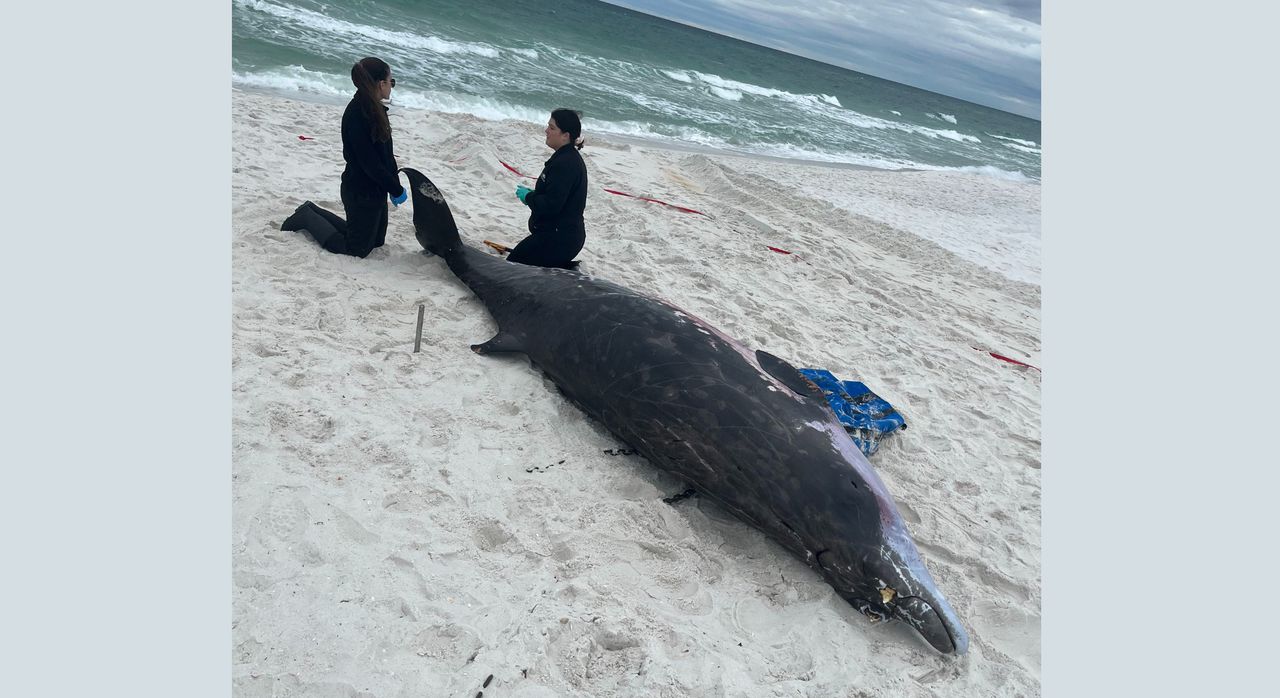Sea Lab: Pollution may have factored in Pensacola death of rare whale
The death of a rare whale found in Pensacola may indicated that plastic pollution is a problem even in the Gulf of Mexico depths that were home to the creature.
The Blainville’s beaked whale was found Jan. 16 on the shore at Pensacola Beach. Its body was taken to the Dauphin Island Sea Lab’s Marine Mammal Research Center for study. The Center recently released partial results.
According to National Oceanic and Atmospheric Administration information, Blainville’s beaked whales grow up to 20 feet long and can weigh up to 2,300 pounds. They commonly dive to depths of more than 3,200 feet and have been known to go as deep as 4,600 feet in dives taking nearly an hour. They are at home in waters “often associated with steep underwater geological structures, such as banks, submarine canyons, seamounts, and continental slopes.”
The beaked whale family is “cryptic and elusive,” according to NOAA, and relatively little is known about Blainville’s beaked whales. In U.S. waters, they’re known to inhabit the waters of Hawaii, the northern Gulf and the western North Atlantic.
NOAA says the Gulf stock is considered “strategic” because of the uncertainty about the population and the level of death caused by fishery-related injuries. There may be less than 100 of them in northern Gulf waters, according to the Sea Lab, but there is not enough data on the population for them to be listed as threatened or endangered. They are covered under the Marine Mammal Protection Act.
Florida Panhandle strandings are rare for the species: The last one documented was in 2014, according to a statement issued by the Sea Lab.
“The last beaked whale that washed ashore in the Pensacola area was a Gervais’ beaked whale in 2019,” said Emerald Coast Wildlife Refuge Stranding Coordinator Kennady Brinley. “This is a different species than that stranding, so we had a lot to learn from this case, and performing an in-depth necropsy is a really important step in that process.”
After the Refuge responded to the stranding, a necropsy was conducted on Dauphin Island with assistance from GulfWorld Marine Institute, the University of South Alabama and the Mississippi Aquarium.
This whale was about 13 feet long and weighed 1,600 pounds.
“The necropsy took our team approximately eight hours, during which we carefully inspected every part of the animal for signs of disease, trauma, or other abnormalities,” said the Alabama Marine Mammal Stranding Network’s (ALMMSN) Stranding Coordinator Mackenzie Russell, who operates with DISL’s MMRC. “Upon necropsy, we found several pieces of plastic in the whale’s stomach, healed rib fractures, and possible signs of disease.”
According to the Sea Lab report, “It is uncertain if the ingested plastic debris contributed to the stranding, but the finding highlights that plastic pollution is pervasive and can affect even these rare, deep-diving whales.” Samples collected during the necropsy will be sent off for analysis that may help determine the cause of death. The process could take months.
Anyone who finds a sick, injured, or deceased marine mammal in the southeastern United States is asked to call 1-877-942-5343 as soon as possible. Attempting to push a live animal back into the water is not recommended.
